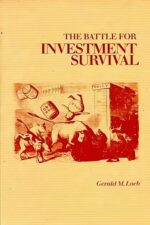The Forever Portfolio: How to Pick Stocks that You Can Hold for the Long Run
$6.05
In The Forever Portfolio, James Altucher shows how to find “”forver”” stocks – ones that can be safely bought and held for at least 20 years. These companies will profit from braod demographic trends and can ride short-term market fluctuations. The Forever Portfolio shows investors how to build a strong, consistent, long-term portfolio, diversified enough to withstand the various cycles of the market.
Author’s Note:
I don’t like to worry. This seems like an obvious statement, hardly worth mentioning in the first lines of a substantial investing book. But the reality is, most people do like to worry. They worry about their investments on a day-to-day basis. They worry about their weight, even though minute by minute there’s almost nothing they can do to change it. They worry about what their boss thinks of them, or they overanalyze the latest e-mails from colleagues, superiors, boyfriends, or girlfriends. People stay up late at night worrying, or they wake up in the middle of the night, plagued by whatever is on their minds.
The human brain has an urge to be active, and in the absence of anything important, the mind creates things to fill the space. These thoughts cover the spectrum, from fretting about a possible terrorist attack to worrying about money, retirement, the health of one’s parents, and so on. And these thoughts could easily be those of a twenty-seven-year-old.
I’ll give you a specific example. In 1999, I was buying an apartment. It was during the height of the tech boom, and I was flush with illiquid paper trading at fairly lofty values. I thought I was rich. I found a beautiful 4,500-square-foot loft with roof access. The real-estate broker showed me a few more places, but I was hooked on that initial apartment. As a last “check the box” moment I asked my broker, Nancy, one final thing: What happens if terrorists blow up the building next door?
“You can’t live your life that way,” Nancy, being the good sales-woman she was, replied. And she was right. Life is short, and the only way we can enjoy it and the relatively few moments we are all given is to not spend them anxious and nervous, constructing fictional scenarios that can drive us crazy. Unfortunately, as it turned out, terrorists did blow up the building next door: The apartment I bought was right next to the World Trade Center. Nothing could alleviate the tragedy that engulfed the families of the victims of the attacks, and the entire neighborhood was completely submerged in the aftermath. Everyone was affected. Lives were lost, the financial markets plunged, and businesses and investment capital were put on hold for years.
The scars of that day of infamy are so deep, it is fair to say that the nation never really recovered. But the great thing about a global economy is that it does recuperate as opportunity finds its way back into the financial system. The key to investing, then, is staying in the game, consistently looking for opportunity and not worrying about all of those things that are meaningless or out of your control.
Why start a book on investing with this discussion of worry? Because this book is not about how to get rich or how to achieve 100 percent returns or whatever it is that most investment books are about. This book is about how to eliminate the distractions so that you can make sound investment decisions, rest easy, and enjoy all of the other aspects of your life. You don’t want to have to look at your investments every day for the rest of your life. You don’t want to have to follow every tick of the markets or panic if they plunge 10 percent in a week, as they often do.
Contents:
- Don’t Be a Forever Contrarian
- Computer Viruses Will Live Forever
- Inoculate Your Portfolio Against the Risk of Global Pandemic
- Diamonds, Clothes, Chocolate
- Common Sense Always Works
- Bubble 2.0
- Crime and Punishment
- The Forever Diet
- There’s No Known Cure
- Drink Clean Water
- The Boring Forever Portfolio
- The Baby Boomers
- The U.S. Gambling Industry
- How to Be a Great Man and Learn from Great Men
- Piggybacking
- Shock-Absorb Your Forever Portfolio and Avoid the Sidewalks
- The Entire Internet Is Going Down and There’s Nothing We Can Do
- Patents Make the World Go ’Round
- Mistakes Were Made; or, Accumulate Small Advantages to Live Forever
- Do You Want to Be a Forever Employee? The Art of Reverse Exploitation
- Internet Forever; or, Five Mistakes I Made as a VC
- Generating Ideas That Last Forever; or, Investing in Your Business/Ideas
- Bloody Marys, Dividends, and the San Francisco Earthquake
- Can You Live and Invest Forever?
- The Forever Student
- Ask Not for Whom the Bell Tolls
- Like Father, Like Son
- Nothing Lasts Forever
The Forever Portfolio: How to Pick Stocks that You Can Hold for the Long Run By James Altucher pdf
| Author(s) | |
|---|---|
| Format | |
| Pages | 182 |
| Publication Year | 2008 |
18 reviews for The Forever Portfolio: How to Pick Stocks that You Can Hold for the Long Run
Only logged in customers who have purchased this product may leave a review.










Yousef Paul (verified owner) –
This book exposes readers to trends that they have never thought of before even though they are sometimes so obvious. For example, as computers became a necessity over the years, the growth of viruses exploded. Companies that protect us from these attacks will always be needed not matter what the economy and the stock market is doing. The author makes readers think in terms of years in the future instead of the next few quarters. I highly recommend this book to investors.
Wrenley Lindsey (verified owner) –
I like the basic idea of the book that time is one advantage individual investors have. Unfortunately, I found the book superficial. The author is on to something but does not develop his thoughts well enough for the reader to take away a truly useful framework for investing.
Matilda Peck (verified owner) –
The premise of the book is quite interesting—what are fundamental trends with significant tail wind? And, indeed, the author throws out some interesting ideas, like varicose vein treatments in response to obesity problems. That said, the book is horribly written—the author has about 20 pages of interesting content interspersed with 200 pages of random digressions, about his love of computer games and the longest words in the English language.
Jayson Zhang (verified owner) –
This is a good book and i respect James efforts to steers us towards respectable companies.
However, as a standalone book it leaves much more to be desired. The students of trading need to revisit the writings of Toby Crabel and Linda Raschke in order to learn from real traders and hedge fund managers. These could be found here or on Ebay. From what i understand James does not trade full time.
Laylah Eaton (verified owner) –
Except for a look at a few charts there is not much of value. There are too many choices to be worthwhile. It’s doubtful if these selections will perform better than an index fund. The book was published with an unfortunate choice of time, January 2008. I haven’t considered it worthwhile to research performance of these “forever” selections though the subsequent downturn. Significantly, there is no summary list of selections.
Many (too many) reasonable recommendations are made with attention towards demographics, technology, stun guns, data security, water production, gambling and other factors. While these seem like timely suggestions, albeit not original, the “forever” value seems dubious. A possible exception is dividend producers. There is perhaps a useful table of the S&P’s best dividend payers, or is it just one more addition to jumble of recommendations?
Most intriguing is a diversion to a preferred stock strategy. He suggests buying Duke Energy preferred stock while simultaneously shorting Duke common to lock in the 15% dividend. I’ve never seen a preferred stock as volatile as the common. If the common goes down it could signify lack of earnings to pay the dividend on preferred as well as common. Does he know that a short seller is charged with the dividend on the common stock? Can somebody clarify the strategy? Is it feasible?
Among a number of disparate strategies, Altucher recommends piggybacking the best investors like Pickens, Buffet, Gates and a bit of Soros. Again there are too many choices for a reasonable selection. Better to read the original contributions of those writers. The most astute strategy might be that of Ben Bernanke who limited his portfolio to a single stock, Philip Morris, currently Altria. Should we save that paragraph and throw away the rest of the book? Altucher later states that the largest holding of his investment company is Altria.
The book is filled with lot’s of pretentious tips on life style from homes to obesity. Skipping college for business may be good advice for some but it’s too late for us old folks and not what I consider investment advice.
Kayla Stephenson (verified owner) –
How often do you laugh out loud reading a finance or business book? Not often? Then, you should give this book a read, and I don’t mean that in a pejorative way.
In one of the last chapters Altucher writes about the potential for a TV channel that exclusively covers people getting tasered. Once you read this book, Altuchers’ description of this idea under the context of that particular chapter might have you laughing to. I found a couple of other instance to chuckle at throughout the book. But, on a more serious note, the book contains some good ideas.
Not only does Altucher write about some long term stocks and industries that have demographic tailwinds, but he also brings home the point that, while the world can be a dirty, unethical and tragic place, one cannot let those negatives swamp the positives, particularly with investment ideas.
World running out of fresh water have you worried? Instead of worry about the problem, why not just invest in companies that deliver and produce clean water? Not only might you make some money, but you’ll also be providing capital to companies who might successfully address the very issues that have you concerned.
Worried about cyber attacks or getting into a car accident? Well, don’t let your intellect get in the way of making money for yourself. Why not invest in companies that thwart attacks or recover totaled autos? These companies have businesses that will survive well into the future.
Altucher also writes some about closed end bond funds and dividend yielding stocks as being solid long term investments and also mentions the benefits of knowing what companies super investors and activist are accumulating positions in.
The one thing I was not really persuaded by in the book was the idea of investing in companies that are trying to develop vaccines. Sometimes vaccines end up being bought exclusively by governments, which isn’t always the best customer for a business to have. Cancer vaccines: so much effort over the years and still so few results. I would prefer genetic testing companies. Find a company with lots of IP protection that will be the first to sequence your genome for a moderate fee; that would be a real winner.
It was an enjoyable book to read and I would recommend it.
Tiffany Wu (verified owner) –
Most of his recommendations are out of business already! Waste.
Joe Suarez (verified owner) –
Good investment thoughts
Briggs Riley (verified owner) –
Worthless and dated information. No real analysis, just conjecture and anecdote. Cannot believe I fell for the other reviews and bought this scam artist. The road to hell my friends….
Griffin Rowe (verified owner) –
Novel reasoning. Original thought. But leading to pretty average conclusions. Nothing magical here.
Leighton Farley (verified owner) –
Muy interesante.
Branson Durham (verified owner) –
This book came to me quickly and was very well put together. It is very good to know what to invest in for the long term.
Jimena Greene (verified owner) –
To me, this book seems better written than his more recent – and more popular – books. (I certainly hope this doesn’t imply that poor writing leads to better sales!)
Despite detours into personal stories about poker, chess and other matters, the author offers some good ideas about long-term investing. The ideas aren’t necessarily unique, but that doesn’t make them worthless. For example, he suggests investing in companies with good management and a history of dividend increase. He also suggests using demographics for picking the sectors to invest in.
This book was published before the 2008 housing and financial crisis, so it is interesting to consider the author’s specific recommendations with the benefit of hindsight. I’m not a stock analyst, but many of his picks seem to have survived the crisis, and perhaps even thrived. Altucher may have clumsy social skills, but he is a smart man with unique experiences and insights in investing and entrepreneurship.
Kyson Cantu (verified owner) –
Really did not get much from this book. I love James other books, however, especially the power of No.
Lewis Berger (verified owner) –
Lots of good advice
Daphne Parsons (verified owner) –
Not very factual, in my opinion.
Juniper Curry (verified owner) –
I have the opinion that James Altucher is honest and intelligent. He has been burnt like many of us. He knows the system is so rigged that an ordinary investor has a minute chance against the PhD mathematics, computers, inside information, derivatives, short selling, options, etc, etc of the greedy elite. James tries to tackfully steer us to solid companies that still derive thier value from solid business principal of growth and dividend yield. I think the book is a great read to try to get your mind clear and refocused if necessary to reality. James is trying to help the average person and he is not trying to fill his own pockets at your expense. Refreshing and ethical.
Sarai Ventura (verified owner) –
Even though this was written quite some time ago, I find that James Altucher’s advice is as relevant today as it was when it was making the predictions and suggestions on how to create the perfect stock portfolio. My keen interest was in the best type of stocks to focus on, and then I discovered the world of Dividend Stocks… what an amazing revelation… now I’m convinced and will make that the primary focus of my stock investments! Thank you!